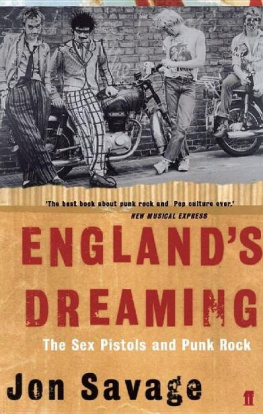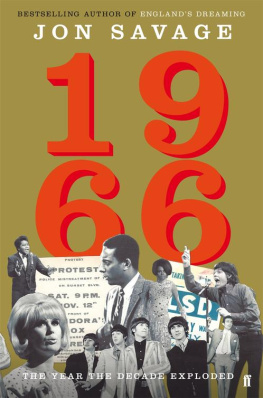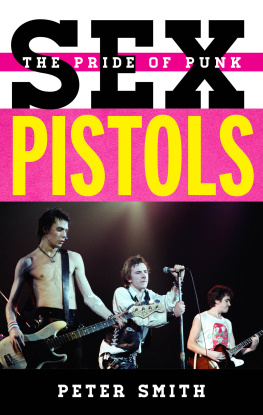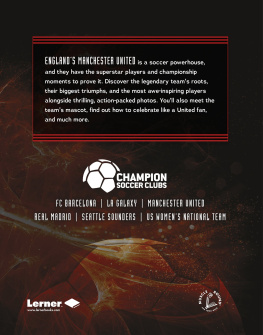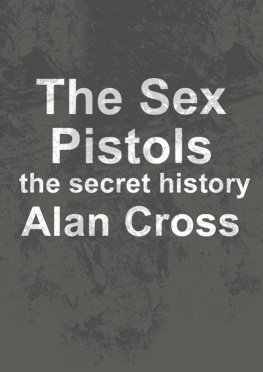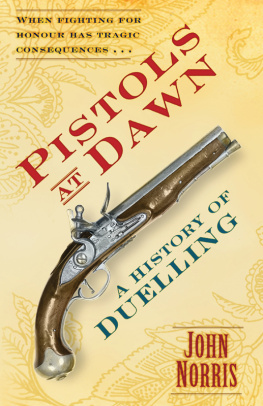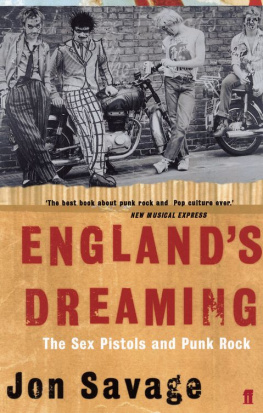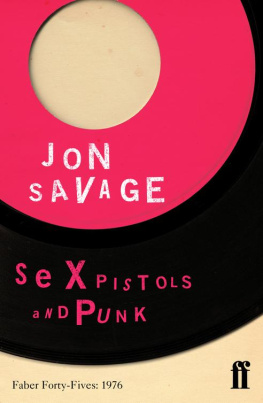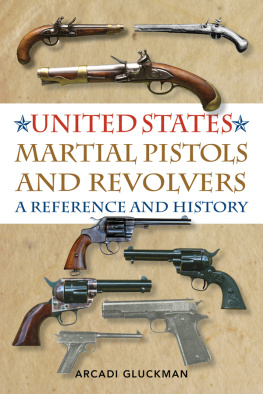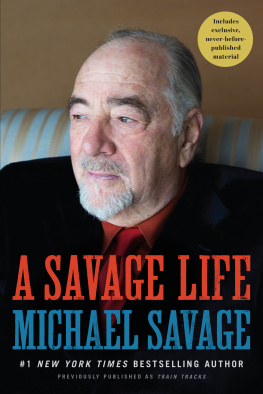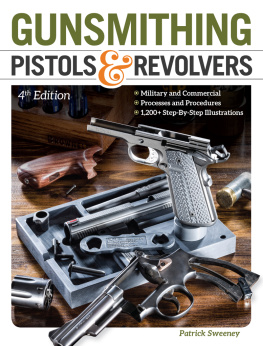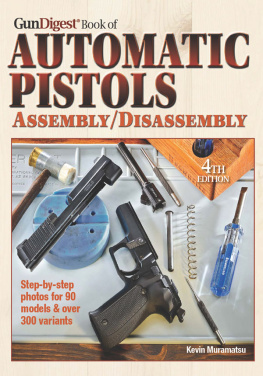Jon Savage - Englands Dreaming: sex pistols
Here you can read online Jon Savage - Englands Dreaming: sex pistols full text of the book (entire story) in english for free. Download pdf and epub, get meaning, cover and reviews about this ebook. year: 2011, publisher: Faber & Faber, genre: Non-fiction. Description of the work, (preface) as well as reviews are available. Best literature library LitArk.com created for fans of good reading and offers a wide selection of genres:
Romance novel
Science fiction
Adventure
Detective
Science
History
Home and family
Prose
Art
Politics
Computer
Non-fiction
Religion
Business
Children
Humor
Choose a favorite category and find really read worthwhile books. Enjoy immersion in the world of imagination, feel the emotions of the characters or learn something new for yourself, make an fascinating discovery.
- Book:Englands Dreaming: sex pistols
- Author:
- Publisher:Faber & Faber
- Genre:
- Year:2011
- Rating:4 / 5
- Favourites:Add to favourites
- Your mark:
- 80
- 1
- 2
- 3
- 4
- 5
Englands Dreaming: sex pistols: summary, description and annotation
We offer to read an annotation, description, summary or preface (depends on what the author of the book "Englands Dreaming: sex pistols" wrote himself). If you haven't found the necessary information about the book — write in the comments, we will try to find it.
Englands Dreaming: sex pistols — read online for free the complete book (whole text) full work
Below is the text of the book, divided by pages. System saving the place of the last page read, allows you to conveniently read the book "Englands Dreaming: sex pistols" online for free, without having to search again every time where you left off. Put a bookmark, and you can go to the page where you finished reading at any time.
Font size:
Interval:
Bookmark:
ENGLANDS DREAMING
Sex Pistols and Punk Rock
Jon Savage

Contents
Parliament Square, London, 1 May 2000 (photo: Russell Boyce/Reuters)
The juxtaposition is simple yet complex enough to be iconic: the monolithic swagger of war-winner Winston Churchill as bulky as the cliffs of Dover in his army greatcoat topped by a brow-to-nape mohican made out of Parliament Squares finest lawn. This is not a tasteful cut, but a full-blown cider punk affair: a lurid green splash against the grey gun-metal sculpture. Conceived by anonymous artists during the May Day anti-capitalism protest in central London in 2000, it became the chief press image of that day, for some a symbol of violence and desecration, for others an example of creative protest a national icon detourned.
The mohican has had a long journey from its native American beginnings. Indian stories by authors like Karl May, Buffalo Bill and Edward Sylvester Ellis were already a staple of boys literature by the last quarter of the nineteenth century, around the time that the last homelands were disappearing in the US. In these action tales, Indians were the underdog: vicious, exotic and savage the perfect role model for teenage malcontents and all those who felt put upon. Indian trappings became popular among delinquents in 1890s London, 1900s Paris and 1930s Berlin, and of these, the mohican was the ultimate. It still is.
As Travis Bickle boils over with rage in Martin Scorseses 1976 Taxi Driver, his transition into a killing machine is symbolised by a brutal mohican: an idea that was not lost on the emerging punk movement which shared much of the films incandescent disgust. The shape of a strip of freshly shorn scalp, the mohican means war, pure and simple. There is a famous Robert Capa photograph of US paratroopers in Northern France, March 1945, with their hair cut mohawk style for luck and esprit de corps for their next days jump over the Rhine into Germany. Clearly, like any potent symbol, this can work several ways.
Attended by 4000 protestors and 5500 police, the May Day 2000 riots provoked a furious national debate, with the punked-up Churchill providing a convenient rallying ground for all parties. One letter writer to the Guardian dared to suggest that, indeed, if Churchill had had such a mohican, hed have kicked Hitlers ass in two rather than six years. In an emotional article, Emma Soames wrote about the photographs of my grandfather so defaced and dishonoured I could hardly believe my eyes. There was even a prolonged discussion of the mans life and crimes in the letter pages of the music press. And the Mirror pitched in with the simple question: Where would these yobs have been if the Nazis had won?
For the children of the 50s and the 60s, Churchill was the ultimate grand/father his funeral in January 1965 was a national event on the scale of Princess Dianas funeral. For the last sixty years, he has been held up as a national hero, perhaps even more sacrosanct than the Royal Family (until the Sex Pistols got involved, but youll notice even they did not question Churchills human-being status). He has thousands, perhaps millions of unquestioning admirers, and rightly so: for, as Michael Korda observed in the May 2000 Harpers, it can truly be said of him, as of perhaps no other figure of the twentieth century, that he saved the Western world without him we would very likely be living in a world dominated by Hitlers heirs and Hitlers ideas. Because of him we are not.
And yet, like all heroes, he has feet of clay. An unreported but significant feature of the May Day painting, apart from the blood coming out of Churchills bulldog jaw, was a simple acronymic graffiti TIKB placed by the Turkish Communist Party, protesting the botched invasion of Turkey at Gallipoli in 1915 for which Churchill, as First Lord of the Admiralty, was responsible. Then there were his actions during the 1926 Miners Strike when, as Chancellor of the Exchequer, he orchestrated what Robert Graves called the news service of the Law-and-Order party. For others, the sight of Churchill with Punk/anarchist insignia was delicious payback for the siege of Sidney Street in January 1911, when Churchill as Home Minister sent in the guns against armed police killers who, in the intervening press hysteria, had grown into an army of anarchists led by the Russian Peter the Painter.
For many protestors, Churchill served as a prime avatar of the ruling class. The sacking of his statue might well have served to obscure the global nature of the urgent demonstration at hand, but it also served to reintroduce the spectre of Punk as the bourgeois demon, the harbinger of the anarchist apocalypse just like that 1911 bogeyman, Peter the Painter, who was never clearly identified and never found. And it plugs straight into a debate about national identity, between the haves and the have-nots, the included and the excluded, between those who accept or reject the dominant perception. As the Sex Pistols sang: now is the time to realise, to have real eyes.
A quarter century after Punk, England is still dreaming, its New Labour consensus brittle, fearful, beset by demons both imaginary and real. It is fair to relate the government to the country partly because of the sheer weight of the May 1997 election victory, but also because national identity has been an explicit project of New Labour the reclaiming of the flag for modern Britishness, the wresting of it away from malign, Thatcherite nationalism. You only need to look at the incidence of the Union Jack in political and pop iconography to see that national identity was a hot issue throughout the 90s: whether it be Neil Kinnocks 1992 party platform, Noel Gallaghers guitar, or Liam and Patsys pillows and duvet on the March 1997 Vanity Fair London Swings Again cover.
The Union Jack is the symbol of the political union between England, Scotland, Wales and Northern Ireland. It is far from being an equal partnership. England, and the South East in particular, dominates the economy, class system and perception of these islands. The Union Jack-strewn Britpop a case in point did not reflect Britains multicultural reality but highlighted, almost exclusively, white rock groups from the South East. So it wasnt Britpop because dance music is mainstream pop but Engrock, and this is a small example of the problem. Yet this kind of unquestioning English superiority is under constitutional attack as never before, with the successful institution of assemblies in Scotland and Wales and with the increasing centralisation of Europe.
The reality of the situation is that England is going to have to reexamine some of its dearest shibboleths. Hugo Young is right to say (in the Guardian, March 2000), that Britain cant survive if England remains the centralised and dominant substate. The mutual resentments will pull it apart. That little-island mentality that loathes Europe and will do anything to sabotage closer European links ignores both the wishes of a substantial part of Britains young and the fact that Britains special relationship with an increasingly isolationist US cannot be taken for granted. History is on the side of devolution and monetary union, yet there are many, from Conservative leader William Hague down with his xenophobia and anti-Europeanism who stand like King Canute before the waves.
That old England erupted across the worlds media in June 2000, when a strongly nationalistic contingent ran amok in Brussels and Charleroi during Euro 2000. Despite the fact that they comprised a tiny proportion of England football followers, there was even talk about expelling the country from the championship. Football had been part of the new Britain ever since the ecstatic summer of 1990 marked by New Orders halfway decent official England theme, World In Motion but now the middle-class/media worship of the great game and its worst attitudes had run up against the reality of the hooligan rump. Within lad cultures heavily marketed worship of sexism, alcohol and machismo, it was possible to see this splenetic bout as one logical conclusion to the whole rotten idea.
Next pageFont size:
Interval:
Bookmark:
Similar books «Englands Dreaming: sex pistols»
Look at similar books to Englands Dreaming: sex pistols. We have selected literature similar in name and meaning in the hope of providing readers with more options to find new, interesting, not yet read works.
Discussion, reviews of the book Englands Dreaming: sex pistols and just readers' own opinions. Leave your comments, write what you think about the work, its meaning or the main characters. Specify what exactly you liked and what you didn't like, and why you think so.

